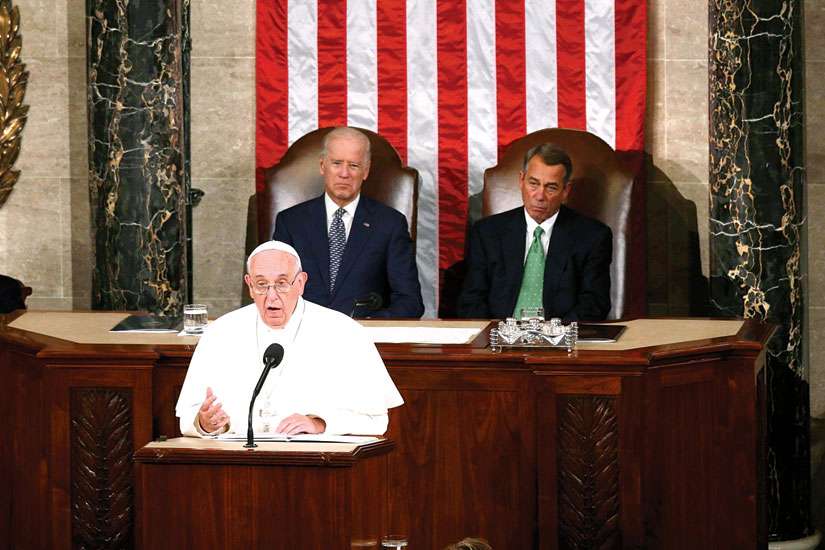For a week in September the world watched 78-year-old Pope Francis present a perfectly integrated personal and political vision.
The political Pope stood before Congress and reminded them how public service is supposed to work.
“You are called to defend and preserve the dignity of your fellow citizens in the tireless and demanding pursuit of the common good, for this is the chief aim of all politics,” he told senators and representatives in Washington.
The personal Pope was on view three days later at the Curran- Fromhold Correctional Facility. He stood before convicted murderers, rapists, gangsters and drug dealers and said, “I am here as a pastor but, above all, as a brother, to share your situation and to make it my own… All of us need to be cleansed. I am first among them.”
When the Pope tells prisoners that they are in prison to become whole, to reclaim their dignity and then rejoin society, he confronts the politics of recrimination, fear and revenge. He brushes aside arguments for the death penalty and the mantra “life means life.”
Before he even got to the United States, the Pope told reporters on the plane from Cuba, “Life imprisonment is almost a hidden death penalty. You are there and you are dying every day without any hope of freedom.”
The personal Pope was also evident during a private meeting with five survivors of sex abuse, where Francis expressed sorrow and shame.
“Words cannot express my sorrow for the abuse you suffered… I beg your forgiveness,” he told the survivors. “For the sins of omission on the part of Church leaders who did not respond adequately to reports of abuse made by family members, as well as by abuse victims themselves.”
But Francis also knows that victims require an institutional response to the harm they suffered.
“God weeps,” he told bishops and seminarians in Philadelphia as he broached again the subject of sex abuse. “I commit to the careful oversight to ensure that youth are protected.”
The Pope’s biggest political project, one that has dominated his entire year, has been to move world leaders to act on climate change. At the United Nations he reminded the world’s diplomats of the purposes of both the UN as an institution and of international law.
“It must be stated that a true ‘right of the environment’ does exist,” said Francis. “We human beings are part of the environment. We live in communion with it, since the environment itself entails ethical limits which human activity must acknowledge and respect.”
This is politics on behalf of individuals who suffer in a “relentless process of exclusion,” said Francis.
“In effect, a selfish and boundless thirst for power and material prosperity leads both to the misuse of available natural resources and to the exclusion of the weak and disadvantaged . . . The poorest are those who suffer most,” he told UN delegates.
Francis knows that what happens politically shapes the personal lives of people who have no power, no influence and perhaps no knowledge of the forces at play.
“Our world demands of all government leaders a will which is effective, practical and constant,” he told the UN. It also demands “concrete steps and immediate measures for preserving and improving the natural environment and thus putting an end as quickly as possible to the phenomenon of social and economic exclusion, with its baneful consequences: human trafficking, the marketing of human organs and tissues, the sexual exploitation of boys and girls, slave labour, including prostitution, the drug and weapons trade, terrorism and international organized crime.”
The Pope was not pulling punches.
“The ecological crisis, and the large-scale destruction of biodiversity, can threaten the very existence of the human species,” he said.
Now is that political, or should we take it personally?


